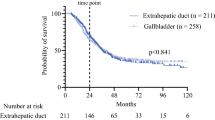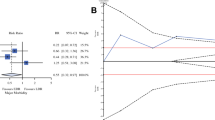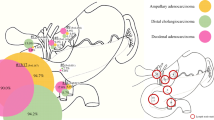Abstract
Background
To date, only limited data are available regarding the routine surgical management of patients with exocrine pancreatic cancer (PC) in German community and university hospitals.
Methods
With the use of a standardized questionnaire, a national survey on surgical and oncological treatment concepts for PC in Germany was conducted on behalf of the Chirurgische Arbeitsgemeinschaft Onkologie and Arbeitsgemeinschaft Internistische Onkologie. The surgical part of that questionnaire contained 25 questions on criteria regarding resectability, surgical techniques, perioperative patient management, and palliative surgical procedures in advanced PC. Data were collected centrally and analyzed using the SPSS® software. Additionally, predefined subgroup analyses, classifying the results by the professional site of the responding physician and the local annual number of treated patients, were carried out.
Results
One-hundred and two questionnaires on the surgical survey section were returned. For the majority of the survey respondents, arterial infiltration is the most important criterion for non-resectability of PC (common hepatic artery, 69.9%; superior mesenteric artery, 85.3%; celiac trunk, 86.3%), whereas only 17.6% would define non-resectability based on portal vein infiltration; 69.9% consider extrapancreatic tumor manifestations as a criterion of surgical non-resectability. Of the survey participants, 53.9% perform a biliary drainage in case of preoperative cholestasis, whereas 43.1% reject this preoperative endoscopic-interventional approach. For cancers of the pancreatic head, 24.5% of surgical units recommend a classical Kausch–Whipple procedure, 52.9% prefer the pylorus-preserving partial pancreatoduodenectomy, and 20.6% use both procedures; 74.5% routinely perform a standard lymphadenectomy, whereas 16.7% prefer an extended procedure. A radical pancreatic resection would be performed by 63.7% of survey respondents also if a single liver metastasis would be found intraoperatively.
Conclusion
Surgical treatment of PC in Germany is heterogeneous; future efforts to implement an evidence-based and standardized surgical management will be necessary.





Similar content being viewed by others
References
Jemal A, Siegel R, Ward E, Hao Y, Xu J, Thun MJ (2009) Cancer statistics. CA Cancer J Clin 59:225–249
Adler G, Seufferlein T, Bischoff SC, Brambs HJ, Feuerbach S, Grabenbauer G, Hahn S, Heinemann V, Hohenberger W, Langrehr JM, Lutz MP, Micke O, Neuhaus H, Neuhaus P, Oettle H, Schlag PM, Schmid R, Schmiegel W, Schlottmann K, Werner J, Wiedenmann B, Kopp I (2007) S3 guidelines “exocrine pancreatic cancer” 2007. Z Gastroenterol 45:487–523
Boeck S, Bruns CJ, Sargent M, Schafer C, Seufferlein T, Jauch KW, Heinemann V (2009) Current oncological treatment of patients with pancreatic cancer in germany: results from a national survey on behalf of the Arbeitsgemeinschaft Internistische Onkologie and the Chirurgische Arbeitsgemeinschaft Onkologie of the Germany Cancer Society. Oncology 77:40–48
Schneider G, Hamacher R, Eser S, Friess H, Schmid RM, Saur D (2008) Molecular biology of pancreatic cancer—new aspects and targets. Anticancer Res 28:1541–1550
Wagner M, Redaelli C, Lietz M, Seiler CA, Friess H, Büchler MW (2004) Curative resection is the single most important factor determining outcome in patients with pancreatic adenocarcinoma. Br J Surg 91:586–594
Sewnath ME, Birjmohun RS, Rauws EA, Huibregtse K, Obertop H, Gouma DJ (2001) The effect of preoperative biliary drainage on postoperative complications after pancreaticoduodenectomy. J Am Coll Surg 192:726–734
Schwarz RE (2002) Technical considerations to maintain a low frequency of postoperative biliary stent-associated infections. J Hepatobiliary Pancreat Surg 9:93–97
Jagannath P, Dhir V, Shrikhande S, Shah RC, Mullerpatan P, Mohandas KM (2005) Effect of preoperative biliary stenting on immediate outcome after pancreaticoduodenectomy. Br J Surg 92:356–361
Mezhir JJ, Brennan MF, Baser RE, D'Angelica MI, Fong Y, Dematteo RP, Jarnagin WR, Allen PJ (2009) A matched case–control study of preoperative biliary drainage in patients with pancreatic adenocarcinoma: routine drainage is not justified. J Gastrointest Surg 13:2163–2169
van der Gaag NA, Rauws EA, van Eijck CH, Bruno MJ, van der Harst E, Kubben FJ, Gerritsen JJ, Greve JW, Gerhards MF, de Hingh IH, Klinkenbijl JH, Nio CY, de Castro SM, Busch OR, van Gulik TM, Bossuyt PM, Gouma DJ (2010) Preoperative biliary drainage for cancer of the head of the pancreas. N Engl J Med 362:129–137
Connor S, Alexakis N, Garden OJ, Leandros E, Bramis J, Wigmore SJ (2005) Meta-analysis of the value of somatostatin and its analogues in reducing complications associated with pancreatic surgery. Br J Surg 92:1059–1067
Zeng Q, Zhang Q, Han S, Yu Z, Zheng M, Zhou M, Bai J, Jin R (2008) Efficacy of somatostatin and its analogues in prevention of postoperative complications after pancreaticoduodenectomy: a meta-analysis of randomized controlled trials. Pancreas 36:18–25
Lüttges J, Zamboni G, Klöppel G (1999) Recommendation for the examination of pancreaticoduodenectomy specimens removed from patients with carcinoma of the exocrine pancreas. A proposal for a standardized pathological staging of pancreaticoduodenectomy specimens including a checklist. Dig Surg 16:291–296
Verbeke CS, Leitch D, Menon KV, McMahon MJ, Guillou PJ, Anthoney A (2006) Redefining the R1 resection in pancreatic cancer. Br J Surg 93:1232–1237
Diener MK, Knaebel HP, Heukaufer C, Antes G, Büchler MW, Seiler CM (2007) A systematic review and meta-analysis of pylorus-preserving versus classical pancreaticoduodenectomy for surgical treatment of periampullary and pancreatic carcinoma. Ann Surg 245:187–200
Siriwardana HP, Siriwardena AK (2006) Systematic review of outcome of synchronous portal-superior mesenteric vein resection during pancreatectomy for cancer. Br J Surg 93:662–673
Farnell MB, Aranha GV, Nimura Y, Michelassi F (2008) The role of extended lymphadenectomy for adenocarcinoma of the head of the pancreas: strength of the evidence. J Gastrointest Surg 12:651–656
Michalski CW, Kleeff J, Wente MN, Diener MK, Büchler MW, Friess H (2007) Systematic review and meta-analysis of standard and extended lymphadenectomy in pancreaticoduodenectomy for pancreatic cancer. Br J Surg 94:265–273
Sasson AR, Hoffman JP, Ross EA, Kagan SA, Pingpank JF, Eisenberg BL (2002) En bloc resection for locally advanced cancer of the pancreas: is it worthwhile? J Gastrointest Surg 6:147–157
Hüser N, Michalski CW, Schuster T, Friess H, Kleeff J (2009) Systematic review and meta-analysis of prophylactic gastroenterostomy for unresectable advanced pancreatic cancer. Br J Surg 96:711–719
Michalski CW, Erkan M, Hüser N, Müller MW, Hartel M, Friess H, Kleeff J (2008) Resection of primary pancreatic cancer and liver metastasis: a systematic review. Dig Surg 25:473–480
Shrikhande SV, Kleeff J, Reiser C, Weitz J, Hinz U, Esposito I, Schmidt J, Friess H, Büchler MW (2007) Pancreatic resection for M1 pancreatic ductal adenocarcinoma. Ann Surg Oncol 14:118–127
Acknowledgements
The authors would like to thank all members of the CAO, AIO, DGVS, and of the GI group of the “Tumorzentrum München” for their active support of this survey. This work is part of the doctoral thesis of Mirja Sargent.
Conflicts of interest
None.
Author information
Authors and Affiliations
Corresponding author
Additional information
Mirja Sargent and Stefan Boeck contributed equally.
Rights and permissions
About this article
Cite this article
Sargent, M., Boeck, S., Heinemann, V. et al. Surgical treatment concepts for patients with pancreatic cancer in Germany—results from a national survey conducted among members of the “Chirurgische Arbeitsgemeinschaft Onkologie” (CAO) and the “Arbeitsgemeinschaft Internistische Onkologie” (AIO) of the Germany Cancer Society (DKG). Langenbecks Arch Surg 396, 223–229 (2011). https://doi.org/10.1007/s00423-010-0695-1
Received:
Accepted:
Published:
Issue Date:
DOI: https://doi.org/10.1007/s00423-010-0695-1




